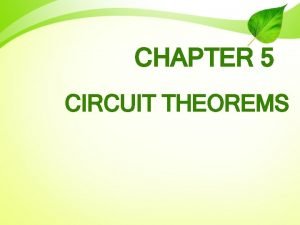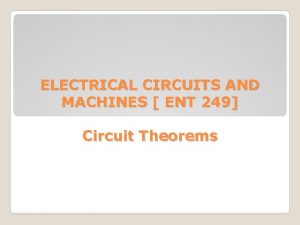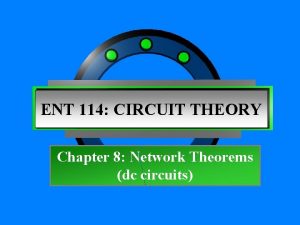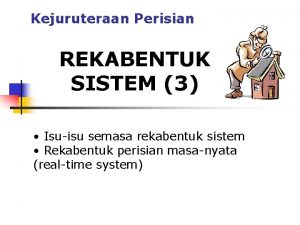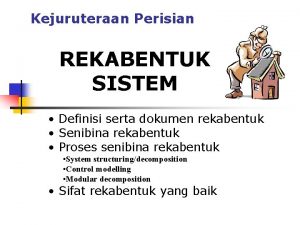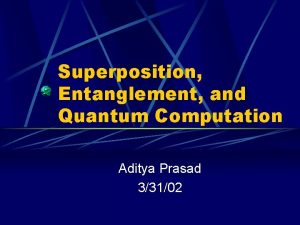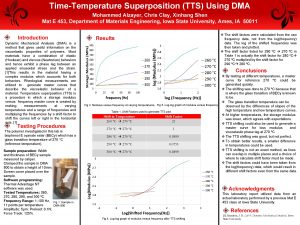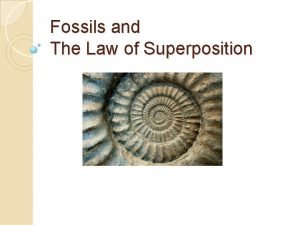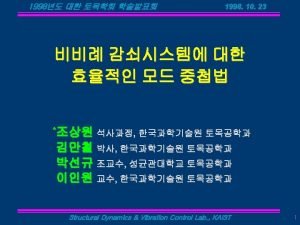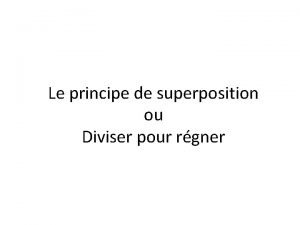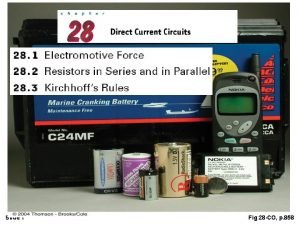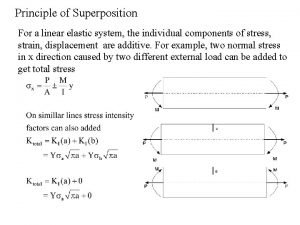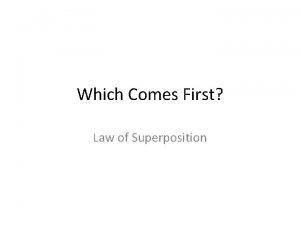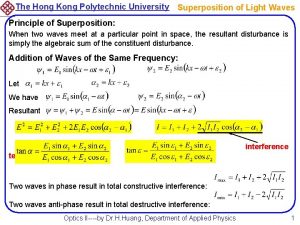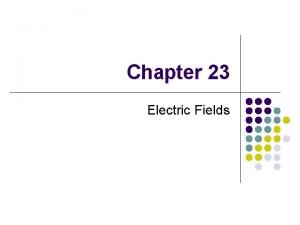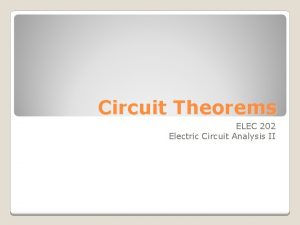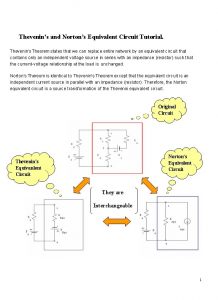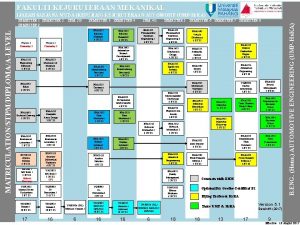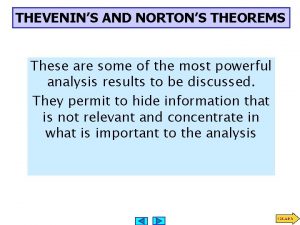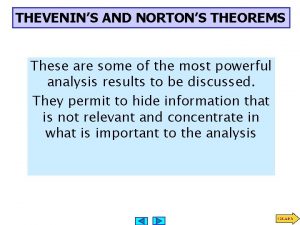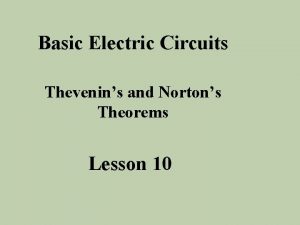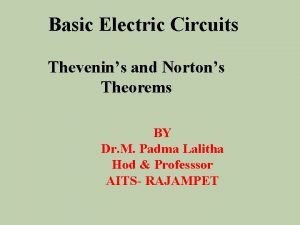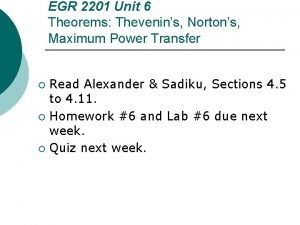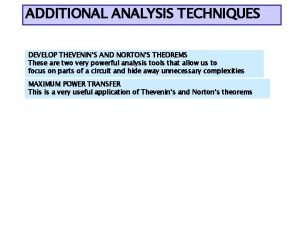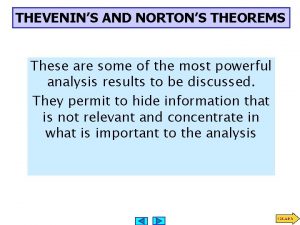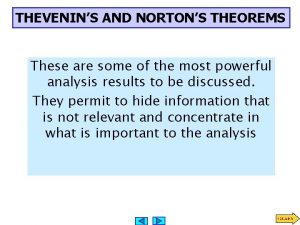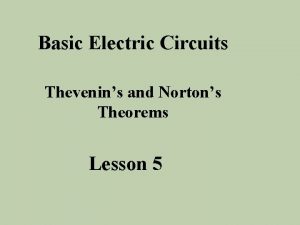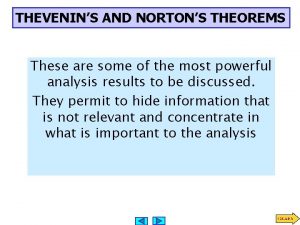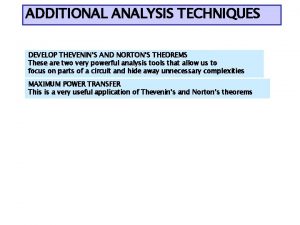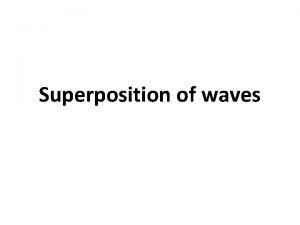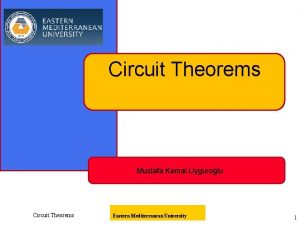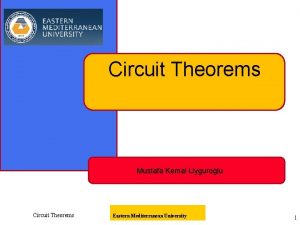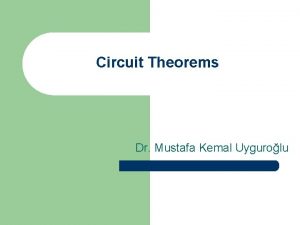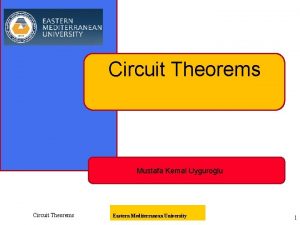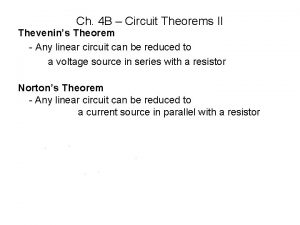Fakulti Kejuruteraan Elektrik CIRCUIT THEOREMS Superposition Thevenins Nortons
























- Slides: 24

Fakulti Kejuruteraan Elektrik CIRCUIT THEOREMS • • Superposition Thevenin’s Norton’s Source Transformation

Fakulti Kejuruteraan Elektrik CIRCUIT THEOREMS • Circuits can be analysed using Kirchhoff’s laws without tampering with their original configurations. • However, for complex and large circuits, using kirchhoff’s laws will be tedious. • Thus circuit theorems can be used to simplify circuit analysis.

LINEARITY PROPERTY 3

Linearity Property It is the property of an element describing a linear relationship between cause and effect. A linear circuit is one whose output is linearly related (or directly proportional) to its input. A circuit is said to be linear if it is both additive and homogenous. A linear circuit consists of only linear elements, linear dependent sources and independent sources. 4

Linearity Property Homogeneity property requires that if an input is multiplied by a constant, then the output is multiplied by the same constant v=i. R → kv=ki. R Additivity property requires that the response to a sum of inputs is the sum of the responses to each input applied separately. v 1 = i 1 R and v 2 = i 2 R → v = (i 1 + i 2) R = v 1 + v 2 5

Linearity Property Example 4. 1 Find I 0 when vs = 12 V and vs = 24 V 6

Linearity Property Example 4. 1 Assume I 0 = 1 A, use linearity to find the actual value of I 0 7

Linearity Property Practice Problem 4. 1 Find vo when is = 15 A and is = 30 A 8

Linearity Property Practice Problem 4. 2 Assume that V 0 = 1 V and use linearity to calculate the actual value of V 0 in the circuit below 9

Linearity Property Problem 4. 4 Use Linearity to determine i 0 10

Linearity Property Problem 4. 5 Assume V 0 = 1 V, use linearity to find the actual value of V 0 11

SUPERPOSITION THEOREM 12

Superposition Theorem It states that the voltage across (or current through) an element in a linear circuit is the algebraic sum of the voltage across (or currents through) that element due to EACH independent source acting alone. The principle of superposition helps us to analyze a linear circuit with more than one independent source by calculating the contribution of each independent source separately. 13

Superposition Theorem Steps to apply superposition principle 1. Turn off all independent sources except one source. Find the output (voltage or current) due to that active source using nodal or mesh analysis. 2. Repeat step 1 for each of the other independent sources. 3. Find the total contribution by adding algebraically all the contributions due to the independent sources. 14

Superposition Theorem Two things have to be kept in mind: 1. When we say turn off all other independent sources: Ø Independent voltage sources are replaced by 0 V (short circuit) and Ø Independent current sources are replaced by 0 A (open circuit). 2. Dependent sources are left intact because they are controlled by circuit variables. 15

Superposition Theorem Example 4. 3 Use the superposition theorem to find v in the circuit shown below. 3 A is discarded by open-circuit 6 V is discarded by short-circuit 16

Superposition Theorem Practice Problem 4. 3 Use the superposition theorem to find v 0 in the circuit shown below. 17

Example 4. 4 Superposition Theorem Use the superposition theorem to find i 0 in the circuit shown below. 18

Superposition Theorem Practice Problem 4. 4 Use the superposition theorem to find Vx in the circuit shown below. 19

Example 4. 5 Use the superposition theorem to find i in the circuit shown below. 20

Superposition Theorem Practice Problem 4. 5 Find I in the circuit below using superposition 21

Tutorial (Superposition Theorem) Problem 4. 11 Use superposition principle to find i 0 and v 0 in the circuit below 22

Tutorial (Superposition Theorem) Practice Problem 4. 15 Use superposition to find i. Calculate the power delivered to the 3 -ohm resistor 23

Tutorial (Superposition Theorem) Practice Problem 4. 16 Find io in the circuit below using superposition 24
 Fakulti pengajian pendidikan
Fakulti pengajian pendidikan Source transformations
Source transformations Dc circuit theorems
Dc circuit theorems Northon theorem
Northon theorem Current devider rule
Current devider rule Dokumen paradigma kejuruteraan perisian
Dokumen paradigma kejuruteraan perisian Langkah membina elips
Langkah membina elips Pengenalan lukisan kejuruteraan
Pengenalan lukisan kejuruteraan Kejuruteraan perisian
Kejuruteraan perisian Reka bentuk kejuruteraan
Reka bentuk kejuruteraan Kejuruteraan pembuatan
Kejuruteraan pembuatan Entanglement vs superposition
Entanglement vs superposition Time temperature superposition dma
Time temperature superposition dma Arrange the cards
Arrange the cards Mode superposition method
Mode superposition method Principle of superposition
Principle of superposition Principe de superposition exemple
Principe de superposition exemple Circuito eletrico
Circuito eletrico Principle of superposition in stress and strain
Principle of superposition in stress and strain Laws of superposition
Laws of superposition Lithostratigraphy
Lithostratigraphy Superposition of light
Superposition of light Superposition principle electric field
Superposition principle electric field Fossil layers
Fossil layers Superposition electric circuits
Superposition electric circuits

